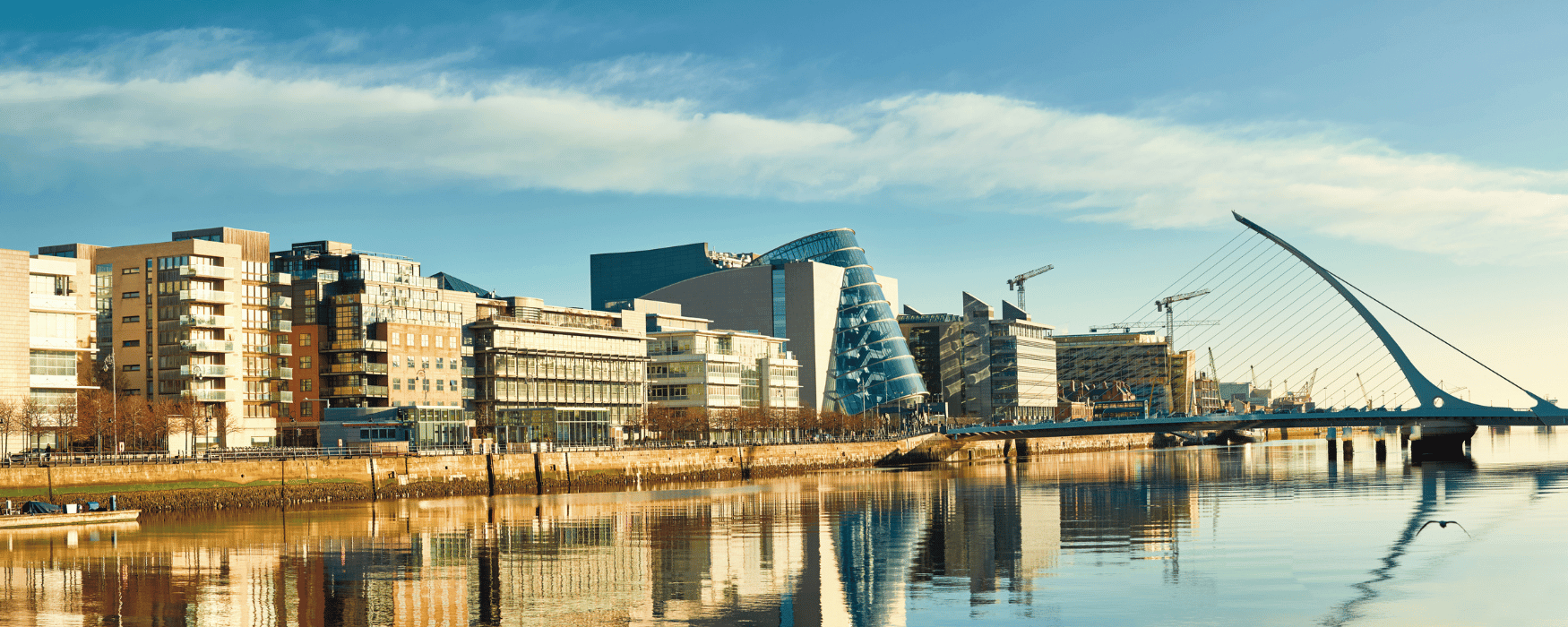Here's some quick facts about Ireland:
Thinking of moving to Ireland? Discover everything you need to know in our Ultimate Ireland Relocation Guide.
Planning a relocation to Ireland? You're in excellent company! Each year, thousands of expats choose the Emerald Isle as their new home, drawn by its thriving economy, warm hospitality, and exceptional quality of life. Whether you're shipping luggage to Ireland or planning every detail of your move, thorough preparation makes all the difference.
Ireland consistently ranks among the world's most desirable destinations for expatriates, offering an unbeatable combination of career opportunities in technology and pharmaceuticals, stunning natural landscapes, and rich cultural heritage. From Dublin's dynamic tech hub to Cork's vibrant culture and Galway's artistic charm, Ireland provides expats with a unique living experience that balances professional growth with an enviable lifestyle.
This ultimate relocation guide will walk you through every essential aspect of moving to Ireland, from visa requirements to settling into daily life. Whether you're planning to work, study, start a business, or embrace a new European lifestyle, we'll provide you with the practical insights needed to make your transition as smooth as possible.
This ultimate guide covers all the essential aspects of relocating to Ireland, including:
We hope this guide both inspires and informs you. As individual circumstances vary, we strongly recommend conducting your own research alongside this guide to ensure your move to Ireland goes smoothly. The information provided, including any costs or procedures, are indicative and correct at the time of publication. Over time and with economical and political changes, and even your own circumstances, these can change.







Moving to Ireland takes thoughtful planning, but the effort pays dividends. The first step is securing the right visa or residence permit for your situation, as this forms the foundation of your relocation. Once your paperwork is sorted, you can focus on the practical side - shipping your belongings to Ireland, finding accommodation (ideally starting with short-term rentals whilst you explore neighbourhoods), and setting up essentials like obtaining your Personal Public Service Number (PPSN), health insurance, bank accounts, and address registration.
It's highly beneficial to research different cities ahead of time to see which ones suit your lifestyle - whether you prefer Dublin's cosmopolitan buzz and tech opportunities, Cork's cultural vibrancy, Galway's artistic bohemian charm, or Limerick's emerging economic growth. By handling these key details early, from flights to finances, you'll make your move smoother and give yourself more time to settle into your new life in Ireland.
Whether you need a visa depends on your nationality. If you're an EU/EEA/Swiss citizen, you can live, work, and study in Ireland freely without a visa or permit. UK citizens also benefit from special rights under the Common Travel Area agreement, allowing residence and work without permits.
If you're from outside the EU/EEA/Switzerland, you'll need the appropriate visa or permit. Choosing the correct visa is crucial to your moving process, and starting early gives you ample time to gather documents and meet all requirements.
The type of visa depends entirely on your circumstances. Your options vary depending on whether you're moving for employment, to study, to join family members, to start a business, or for retirement.
Some of the most common visas include the Critical Skills Employment Permit for in-demand professionals with salaries of €38,000+ (with a degree) or €64,000+ (without), the General Employment Permit for jobs requiring €34,000+ annual salary, and student permits for those enrolled in recognised institutions. Other categories cover entrepreneurs, family reunification, and investors.
Visa applications can take several weeks to months to process, so applying well before your intended relocation date is strongly recommended. Always check the official Irish visa requirements or speak with a qualified immigration adviser to ensure your application is up to date and complete.
Important: Non-EU/EEA nationals on long-stay visas must register their permission with the Immigration Service Delivery (ISD) within 90 days of arrival to receive their Irish Residence Permit (IRP) card - this is a legal requirement.
When relocating to Ireland, it's essential to look beyond visas and moving logistics to fully understand daily life in this welcoming nation. From education and healthcare to housing challenges and managing finances, many key factors influence how successfully you settle in. Whether you're moving to Ireland for work, to start a business, to study, or for family reasons, these are the most common topics people explore when planning their new Irish life.
Ireland offers a peaceful quality of life that appeals to retirees, though it doesn't have a dedicated retirement visa like some countries. Retirees from outside the EU/EEA typically need to qualify under the Independent/Retired Person of Means category, demonstrating substantial financial resources (annual income of at least €50,000) and private health insurance. EU/EEA citizens can retire freely in Ireland. Ireland's excellent healthcare, safe environment, and stunning scenery make it attractive, though costs can be high in major cities like Dublin.
Ireland is one of Europe's most attractive destinations for entrepreneurs, with its competitive 12.5% corporate tax rate, access to EU markets, and thriving startup ecosystem. Dublin has emerged as a major European tech hub, hosting European headquarters for global companies like Google, Facebook, and Apple. The Start-Up Entrepreneur Programme (STEP) offers pathways for innovative entrepreneurs with €50,000 in funding and approved business proposals. Understanding local regulations, tax obligations, and business culture is vital when starting a business in Ireland.
As a booming European economy, Ireland provides abundant employment opportunities across technology, pharmaceuticals, finance, healthcare, and professional services sectors. The Irish work environment emphasises collaboration and work-life balance, with generous holiday allowances (typically 20-25 days annually plus public holidays). For anyone moving to Ireland to work, securing the appropriate employment permit is essential unless you're an EU/EEA/UK citizen. Understanding workplace culture and qualification requirements helps ensure a smooth career transition.
Ireland operates a mixed public and private healthcare system. Public healthcare through the Health Service Executive (HSE) is accessible to all residents based on ordinary residence—if you're living in Ireland with the intention to stay permanently, you're entitled to HSE services immediately. Public healthcare is means-tested, with some services requiring co-payments. GP visits typically cost €50-70 without a medical card. Many residents opt for private health insurance for faster access to specialists and reduced waiting times, with average adult premiums approximately €1,830-€2,000 annually. Leading providers include VHI Healthcare, Laya Healthcare, and Irish Life Health.
Ireland offers an exceptional education system, renowned globally for quality. Primary and secondary education at state schools is free and generally excellent. Ireland is home to prestigious universities including Trinity College Dublin and University College Dublin. International families often opt for international schools offering British, American, or International Baccalaureate curricula (costing €8,000-€20,000+ annually), though many choose quality Irish schools. Irish-language schools (Gaelscoileanna) are increasingly popular for cultural immersion.
Ireland faces a significant housing shortage, particularly in major cities. Finding accommodation is extremely competitive, requiring patience, complete documentation (proof of employment, references), and quick action. Rental costs vary dramatically—expect €2,500+ monthly for one-bedroom flats in Dublin, €1,400-€1,900 in Cork and Galway, €1,400-€1,700 in Limerick. Buying property involves average prices of approximately €365,000 nationally (over €420,000 in Dublin). Housing supply is improving with approximately 32,500 new completions forecast for 2025, rising to 40,000-41,500 by 2027, but demand continues to outpace supply in urban areas. Short-term rentals provide flexibility whilst navigating the permanent housing market.
Ireland's cost of living is relatively high compared to many European countries, with Dublin particularly expensive. Average monthly costs for a single person are approximately €2,300-€3,300 (including rent), whilst families need around €5,600+ monthly. Key costs include housing and utilities (typically the largest expense), food and groceries (€250-€400 single; €600-€900 family), transportation (€60-€130 monthly for public transport depending on city and zones), and health insurance. Ireland's 2025 minimum wage is €13.50 per hour (rising to €14.15 in 2026), with the living wage calculated at €15.40 per hour. Average salaries in technology sectors reach €50,000-€80,000+ annually.
Ireland's road network is well-maintained, though rural roads can be narrow. Driving is on the left side, as in the UK. EU/EEA/UK licence holders can drive indefinitely using their home licence. Non-EU/EEA nationals can use their home licence with an International Driving Permit for up to 12 months before conversion (some countries have reciprocal agreements allowing exchange without tests). Vehicle insurance is mandatory (€500-€2,000+ annually), along with motor tax (€200-€900+ depending on emissions) and petrol costs (€1.60-€1.90 per litre). Many urban residents, particularly in Dublin, choose not to own cars given good public transport, parking costs, and congestion.
Opening an Irish bank account is straightforward once you've completed address registration and obtained your Personal Public Service Number (PPSN). Major banks include AIB, Bank of Ireland, and Permanent TSB. Ireland operates a progressive tax system with income tax rates of 20% on earnings up to €44,000, then 40% above (for single individuals in 2025). Universal Social Charge (USC) ranges from 0.5%-8% depending on income, plus 4% PRSI (social insurance). Tax residency applies if you spend 183+ days in Ireland annually, or 280+ days over two consecutive years (with at least 30 days in each year). Ireland has tax treaties with many countries to prevent double taxation.
Ireland's public transport varies significantly by location. Dublin offers the most comprehensive system with extensive bus networks (Dublin Bus), Luas tram system, DART coastal rail, and commuter trains. The Leap Card provides integrated payment with monthly costs ranging €60-€130+ depending on zones. Cork, Galway, and Limerick have city bus services with monthly passes around €70-€100. Irish Rail connects major cities efficiently. Ride-hailing services like Uber and Bolt are widely available and affordable. Ireland's compact size makes intercity travel convenient, whilst Dublin Airport offers excellent international connectivity.
English is Ireland's primary language, making integration straightforward for English speakers. Irish (Gaeilge) is also an official language, particularly strong in Gaeltacht regions, though fluency isn't required for daily life. Ireland offers remarkable cultural richness with a strong literary and musical heritage. The country is increasingly multicultural and secular, with approximately 70% identifying as Catholic (though church attendance has declined significantly). Freedom of religion is constitutionally protected, with Ireland welcoming all faiths and backgrounds.
Ireland's excellent international connectivity makes arrival straightforward. Major airports include Dublin (DUB), Cork (ORK), and Shannon (SNN), offering direct flights to Europe, North America, and beyond. Customs and immigration processes are efficient, though ensuring visa documentation is complete helps avoid delays. Ferry services connect Ireland to the UK and France, providing convenient options particularly for bringing vehicles or pets. Dublin Airport serves as Ireland's primary international gateway with modern facilities and good ground transport links.

If you're planning to bring your pets when moving to Ireland, it's absolutely possible, though it requires careful preparation and advance planning. Ireland has regulations to prevent rabies and protect animal health, but the process is straightforward when you understand the requirements.
Most people relocate with cats or dogs, though requirements depend on several factors: animal type, country of origin, pet's age, and available veterinary documentation. Key requirements typically include microchip (ISO-compliant 15-digit), valid rabies vaccination (at least 21 days before travel), EU Pet Passport (from EU countries) or official veterinary certificate (from non-EU countries), and tapeworm treatment for dogs (24-120 hours before entry).
Important: Pets must enter through approved routes and may be subject to checks by Department of Agriculture officials. Pets from Great Britain now require Animal Health Certificates issued within 10 days of travel. Pets from Northern Ireland follow simpler procedures.
To ensure you have the most current information, check directly with the official Irish pet travel website or contact the Department of Agriculture, Food and the Marine. Starting this process early is highly recommended, and professional pet relocation services can assist with complex moves.
Moving personal belongings to Ireland used to mean relying solely on traditional removal companies with lengthy timelines and significant costs. Today, My Baggage offers a faster, more affordable alternative by using air freight courier services, ensuring your items reach Ireland quickly and securely.
Whether you're shipping luggage, sending boxes, transporting golf clubs, or moving bicycles to Ireland, My Baggage provides a reliable door-to-door international removals service with full online tracking and dedicated customer support. From a few bags to larger shipments of personal effects, their service ensures your belongings are handled with care and arrive safely, giving you peace of mind throughout the process.
Whether you're dealing with excess baggage from your flight or need to send items ahead, My Baggage offers flexible solutions tailored to your relocation needs.
My Baggage specialises in shipping personal belongings to Ireland, offering a great alternative to paying excess baggage fees with airlines, making it an excellent choice for your move to Ireland.









If you're planning to move to Northern Ireland, you'll be choosing a wonderful destination with stunning landscapes, warm hospitality, vibrant cities, and a spectacular coastline. While Northern Ireland is located on the island of Ireland and shares much culturally with the Republic of Ireland, it's important to understand that administratively, Northern Ireland is part of the United Kingdom.
This distinction matters for your move: the relocation process, documentation requirements, and regulations differ from those for moving to the Republic of Ireland. Under the Common Travel Area, there's no physical border between the two, allowing free travel for citizens of Ireland, the UK, and certain others - though everyone should carry appropriate ID. For non-citizens, you'll need to follow UK immigration and customs procedures via UK Visas and Immigration (UKVI) rather than those for the Republic of Ireland.
For accurate, up-to-date information about relocating to Northern Ireland, please refer to our UK Moving Guide, which covers all the relevant requirements and processes you'll need to know.





